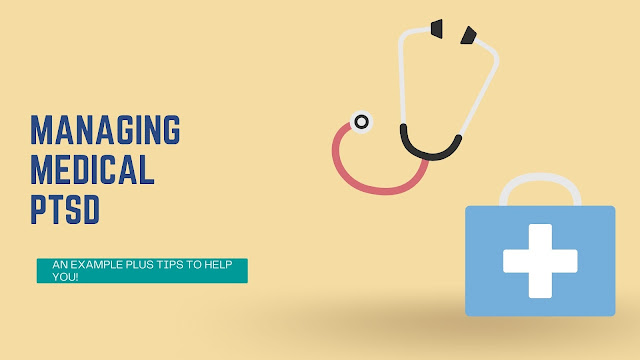By Kara Jackman
Episodes of medical PTSD can hit anyone at any time. We carry all this trauma around with us every day like an invisible backpack on our shoulders. It isn't until a triggering event occurs that we realize that backpack even exists. I know many in our CCA community experience these triggers on a daily basis, so I hope through a brief personal story that I can help you manage the anxieties, sadness, and other emotional pain caused by trauma in constructive ways.
A Medical PTSD Triggering Event
A few months ago I had a sinus infection that necessitated some medical treatment. Antibiotics were in order, I had waited long enough. Thanks to COVID-19 and working at a University, I was required to go see my primary care for this particular doctor's visit. The appointment began pretty normally, lots of questions, I croaked out answers as the pain reverberated around my throat and vocal cords. Then, the physicians' assistant took the typical look in the throat a bit too far. She looked at my throat for over 20 minutes requiring me to open my mouth multiple times for long durations. My arthritic jaw was in acute pain, eyes were tearing up, and the tongue depressor got wet and gross. My gag reflex joined the party I was involuntarily invited to. I asked twice for her to get a new tongue depressor, but she only flipped it over. Then, finally, I gathered the courage to ask a third time. She obliged, but not before my gag reflex went off a few more times.
What was taking so long? Why was she looking at my throat like it held hidden secrets of some grand Egyptian temple? She gazed and gawked for nearly half the appointment time. Whether the throat was infected or not, the end result was going to be the same thing, oral antibiotics, and maybe if I was lucky some steroids for the pain.
And now the questions, "where are your tonsils?" she asked.
"I don't know they probably got taken out, or never existed in the first place. Why?" I responded.
Breezily, she said, "I don't know. I was just wondering."
I endured and persevered this long examination the entire time wondering if I needed surgery or if something was seriously wrong with my throat. Maybe I had really done some damage, or maybe this sinus infection was not a sinus infection at all. While I continued to worry and muse, she finally finished.
It took all my courage to ask her again, as tears streamed down my face, “why were you looking at my throat for so long?
She said, "I wanted to take a good look."
I asked, "Are you curious about my anatomy?"
She said "No, i just wanted to make sure everything was clear."
False. That was a lie. Just saying...but it had to be said.
Finally, I capped off our conversation by informing her that when anyone examined me for that long it meant surgery. I cried some more, figuring it was a better emotional road than the fury that sat in my chest.
She said she was glad she told me that information. She was receptive and nimble enough to say she was grateful for how my past history informed this moment.
After A Triggering Event
Days later, I was still hurting, sad, angry, upset. The event circulated around my head for a while after it happened. Each time I thought about it, though, I congratulated myself on how I handled it. The idea is to advocate for yourself, informing the caretaker or medical professional about the way you feel in the moment. This could positively affect how they manage future patient interactions, and future appointments with you.
De-Stress and Process
Also, in the days that follow this kind of incident, create time and space to process the emotions and thoughts you are dealing with. This part is hard, and for me involves some serious self care, yoga, exercise, taking a bath, painting my nails, reading and journaling, while cognitively restructuring my thoughts about the event. Negative or retriggering thoughts ("I'm so scared." "Maybe there really is something wrong with my throat.") lead to increased anxiety and sadness. It is vital to distract yourself with fun things while you do the hard work of accentuating the positive thoughts and experiences from the triggering scenario. Though this is time consuming, and sometimes hard, cognitive restructuring and distress tolerance always help keep my emotional pain at bay.
Talk To Someone
 |
| Image Credit: IStock |
In addition to the internal work described above, you may want to talk to someone you trust about the triggering event and the past traumas you have endured. Be willing to accept help from people like trusted friends, therapists, parents, priest, pastors, or whomever you deem trustworthy. People in our CCA community are a perfect example of a group of people you can trust because they have walked a similar path. Be open to help from others. If someone says, "no" or they seem disinterested, move on to the next person.
Inform
Finally, inform the medical provider about your medical trauma or anxiety. Don’t ever be afraid to show your true emotions to medical staff. If the feelings are too intense in the moment, you may have to go back later to have that conservation. Doctors' offices and hospitals often send out surveys after appointments. Take them! The feedback, positive or negative, could help the next person, or it could begin a dialogue that could improve your medical care. Another avenue would be contact the hospital or medical center's patient relations department. Doctors, physician's assistants, and other medical professionals are all in helping professions. They need the feedback to improve the ways in which they can help.Finally, trauma rewires the brain. I believe the psychological and mental burden is the hardest part of the craniofacial life. Your mental health and emotional reactions to people, places, and events in your environment can all be triggers. Be ready with your distress tolerance skills to keep you calm. Breathe! Breathe deeply from the abdomen engaging the diaphragm, and imagine breathing out the pain down into your legs and out the soles of your feet. Be patient you can get through it!
Yes, it's unfortunate that sharing this with the people that care for us is our job. This part of our lives is truly exhausting. But the more we talk about it with the people that treat us and care for us, the closer we will get to trauma-informed care. Education and awareness raising is the only way — and sadly we and our allies are the only teachers!



It is what I was searching for is really informative. Ptsd Treatment For Veterans Missouri It is a significant and useful article for us. Thankful to you for sharing an article like this.
ReplyDelete